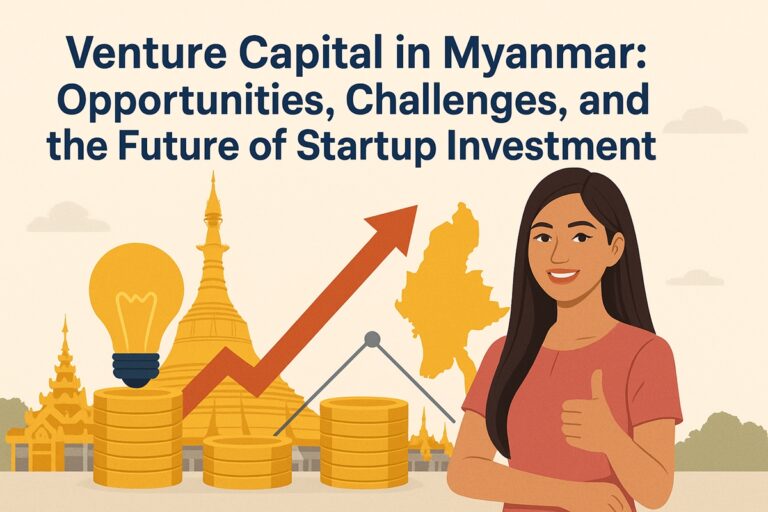
Venture Capital in Myanmar: Opportunities, Challenges, and the Future of Startup Investment
Introduction: The Rise of Venture Capital in Myanmar
Venture capital (VC) in Myanmar is gradually emerging as a vital force behind the country’s startup ecosystem. Over the past decade, Myanmar has shifted from an isolated economy to an investment-friendly frontier market, attracting both local and international investors. Despite political and infrastructural challenges, the potential for growth remains significant — particularly in technology, fintech, agriculture, logistics, and renewable energy.
As Myanmar continues to rebuild its economy and integrate into regional trade networks, venture capital investment is expected to play a transformative role in creating new jobs, boosting innovation, and connecting the nation with the global digital economy.
What Is Venture Capital and Why It Matters
Venture capital is a form of private equity financing where investors fund early-stage companies with high growth potential. In return, investors receive equity or ownership stakes in these startups. VC funding not only provides financial backing but also access to networks, mentorship, and global markets.
In emerging economies like Myanmar, where traditional bank loans are difficult for startups to obtain, venture capital serves as the backbone of entrepreneurial development. It bridges the funding gap between ideas and execution — empowering founders to scale products, hire talent, and compete regionally.
The Evolution of Venture Capital in Myanmar
Early Phase (2010–2015): The Frontier Market Awakens
Following economic reforms in 2011 and the opening of Myanmar’s market to international trade, a wave of entrepreneurial activity began. Startups like Oway, Shop.com.mm, and Flymya attracted early investors from Singapore, Japan, and Hong Kong. Development agencies and accelerators — such as USAID’s Phandeeyar Accelerator and Impact Hub Yangon — introduced incubation programs to nurture Myanmar’s first generation of tech founders.
During this period, most investments came in the form of seed or angel funding, as venture capital firms were still testing the waters.
Growth Phase (2016–2019): The Startup Boom
Between 2016 and 2019, Myanmar experienced a startup boom. The rise of affordable smartphones, better internet access, and fintech innovation opened the door to VC-backed ventures. Startups like Wave Money, ConnectN, and Kargo drew multimillion-dollar funding rounds. Regional venture firms — including 500 Startups, BEENEXT, and Revo Capital — began to show interest in the Myanmar market.
This phase marked Myanmar’s emergence as a new Southeast Asian tech frontier, often compared to Vietnam a decade earlier.
Challenges and Adjustments (2020–2023)
The COVID-19 pandemic and subsequent political instability slowed down the momentum. Many venture capital firms paused new investments or redirected funds to portfolio maintenance. However, local entrepreneurs continued to adapt by focusing on resilient sectors such as agritech, healthtech, and logistics, which remained essential despite disruptions.
By 2023, Myanmar’s startup scene was smaller but more mature. The focus shifted toward sustainable growth, local partnerships, and self-reliance, with investors preferring transparent, impact-oriented businesses.
Key Sectors Attracting Venture Capital in Myanmar
1. Fintech and Digital Payments
Myanmar’s unbanked population — over 70% of adults — presents a huge opportunity for fintech innovation. Companies like Wave Money and AYA Pay are bridging this gap through mobile wallets and digital remittances. International investors recognize fintech as the fastest-growing sector, driving inclusion and reducing reliance on cash.
2. Agriculture and AgriTech
Agriculture remains Myanmar’s economic backbone, employing nearly 60% of the workforce. Venture capital in agri-tech helps farmers access better pricing, logistics, and climate-smart solutions. Startups leveraging drones, AI analytics, and e-commerce platforms are transforming rural productivity.
3. E-Commerce and Logistics
E-commerce in Myanmar continues to grow rapidly, with increasing smartphone usage and delivery demand. Logistics platforms such as Kargo have attracted foreign VC support due to the country’s need for efficient supply-chain systems.
4. Renewable Energy and Green Technology
Given Myanmar’s vast hydro, solar, and biomass potential, renewable energy startups have become attractive to impact investors and climate funds. These ventures address both rural electrification and environmental sustainability.
5. Education and HealthTech
Post-pandemic realities have accelerated online learning and telemedicine adoption. EdTech and HealthTech ventures are drawing attention from social-impact VC firms focused on long-term human development.
Major Venture Capital Firms Active in Myanmar
While Myanmar’s venture capital ecosystem is still developing, several regional and international funds have made early moves:
500 Startups (Singapore) – Supported early Myanmar entrepreneurs through mentorship and micro-funding.
BEENEXT (Japan) – Focused on Southeast Asia, with investments in digital payments and logistics.
Revo Capital (Singapore) – Invested in frontier-market startups with scalable tech solutions.
Ant Financial / Alibaba Group – Backed Wave Money’s expansion into rural Myanmar.
Insitor Impact Asia Fund – One of the few funds actively supporting social-impact ventures in Myanmar.
Delta Capital Myanmar – A homegrown private equity and venture firm managing multiple funds across sectors.
These firms not only provide funding but also strategic guidance, helping startups align with global business standards and compliance frameworks.
Government and Policy Environment
Myanmar’s government has made efforts — albeit inconsistently — to create an investment-friendly climate. Key frameworks include:
The Myanmar Investment Law (2016) – Streamlined procedures for both local and foreign investors.
The Central Bank’s Fintech Guidelines (2019) – Helped legitimize digital payment platforms.
Myanmar Companies Law (2018) – Allowed foreign investors to hold up to 35% in local firms.
However, regulatory unpredictability and political risks continue to deter many global investors. Strengthening transparency, legal protections, and infrastructure is critical for the long-term success of the VC ecosystem.
Challenges Facing Venture Capital in Myanmar
Despite strong potential, several challenges persist:
Political Instability – Uncertainty affects investor confidence and cross-border fund flows.
Weak Infrastructure – Limited broadband, logistics, and power reliability slow down scalability.
Currency Volatility – Exchange-rate fluctuations pose risks to foreign investors.
Limited Exit Opportunities – Few mergers, acquisitions, or IPOs make it difficult for VCs to realize returns.
Talent Gaps – Many startups struggle to find experienced developers, managers, or financial experts.
These barriers mean investors must take a long-term, risk-tolerant approach to Myanmar’s startup ecosystem.
The Future of Venture Capital in Myanmar
Despite challenges, Myanmar’s long-term outlook remains positive. The country’s young population, growing digital literacy, and regional connectivity through ASEAN make it an attractive, though volatile, market. As peace and economic reforms progress, foreign investors are expected to return cautiously.
Future trends to watch:
Rise of Local VC Funds: Local investors are starting to pool capital to support homegrown entrepreneurs.
Impact Investing: Growing interest in businesses with measurable social or environmental outcomes.
Regional Integration: Myanmar startups could serve as gateways between South Asia and ASEAN markets.
Blockchain and Fintech 2.0: Digital currency and cross-border payment innovations could reshape Myanmar’s financial future.
The road ahead will require resilience, adaptability, and collaboration between government, investors, and entrepreneurs — but the foundations of a vibrant venture capital ecosystem are already in place.
How Entrepreneurs Can Attract Venture Capital in Myanmar
To succeed in attracting investors, founders should:
Develop a Scalable Business Model – Focus on real-world problems with regional growth potential.
Ensure Financial Transparency – Keep accurate financial statements and governance structures.
Build a Strong Founding Team – VCs invest in people as much as in ideas.
Demonstrate Market Traction – User growth, partnerships, and early revenues are key proof points.
Leverage Networking Platforms – Events, accelerators, and LinkedIn communities help connect founders to global investors.
By understanding VC expectations, startups in Myanmar can position themselves for long-term success.
Conclusion
Venture capital in Myanmar is more than a financial trend — it’s a catalyst for innovation, inclusion, and global integration. Despite ongoing political and economic turbulence, Myanmar’s entrepreneurs continue to innovate, adapt, and inspire. With strategic reforms, investor confidence, and sustained digital growth, the country has the potential to emerge as Southeast Asia’s next startup frontier.
Frequently Asked Questions (FAQ)
Q1: What is venture capital in Myanmar?
Venture capital in Myanmar refers to private investment in startups and small businesses with high growth potential, often in exchange for equity.
Q2: Which sectors attract the most venture capital?
Fintech, e-commerce, agriculture, renewable energy, and logistics are among the most active sectors for VC investment.
Q3: Are foreign investors allowed to fund startups in Myanmar?
Yes. Under Myanmar Companies Law (2018), foreign investors can own up to 35% of local firms, and some fully foreign-owned startups operate legally under investment permits.
Q4: What are the biggest challenges for venture capital in Myanmar?
Political instability, limited exit routes, regulatory hurdles, and infrastructure issues remain key obstacles.
Q5: What is the future outlook for Myanmar’s startup ecosystem?
The outlook is cautiously optimistic. With digital transformation, youth entrepreneurship, and regional cooperation, Myanmar’s VC sector could expand significantly in the next decade.




